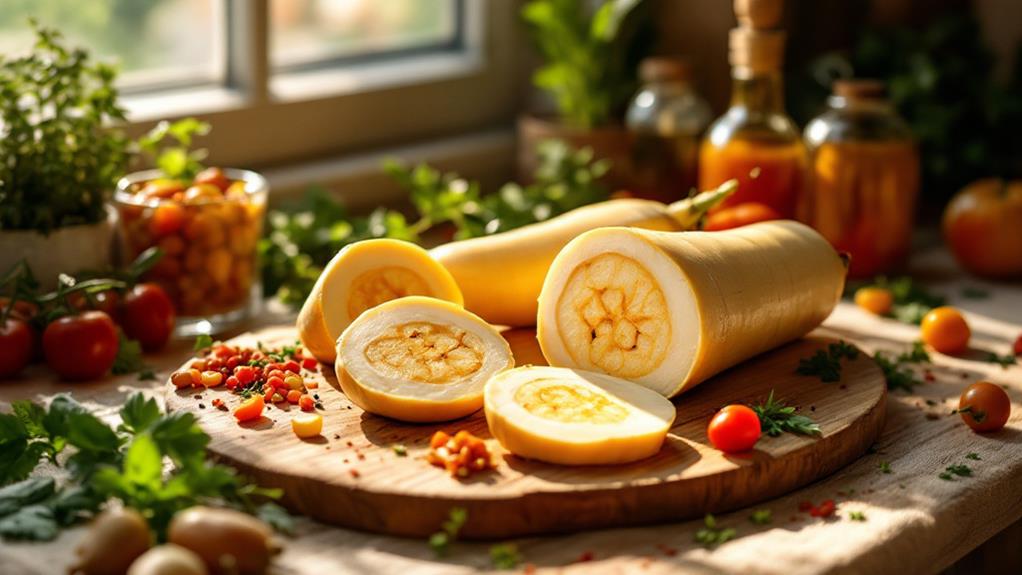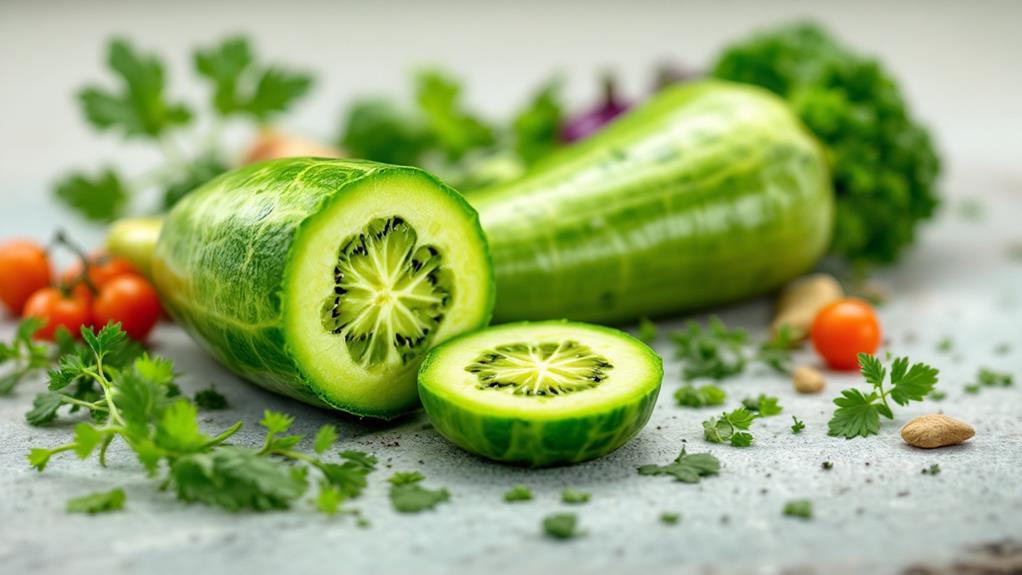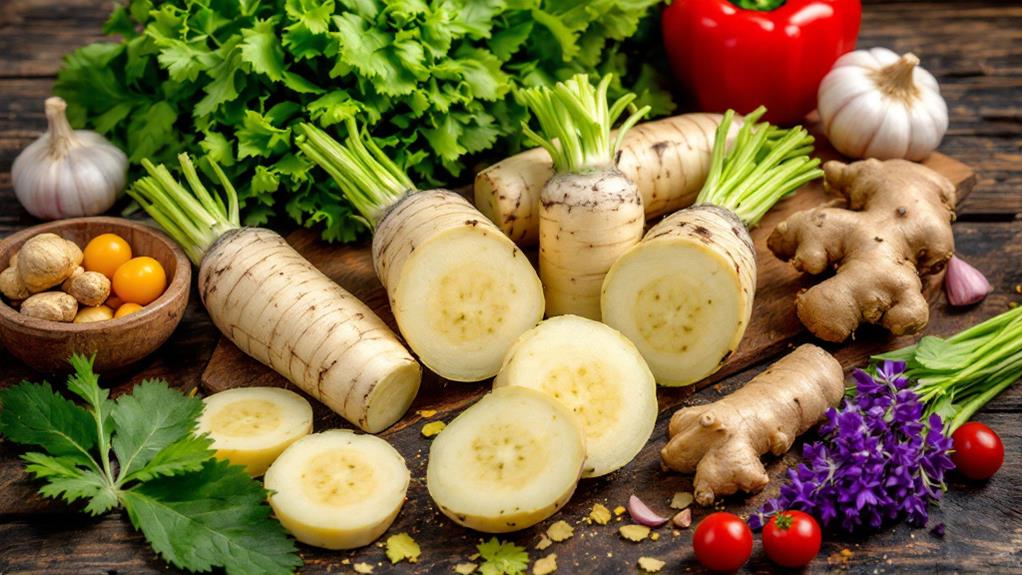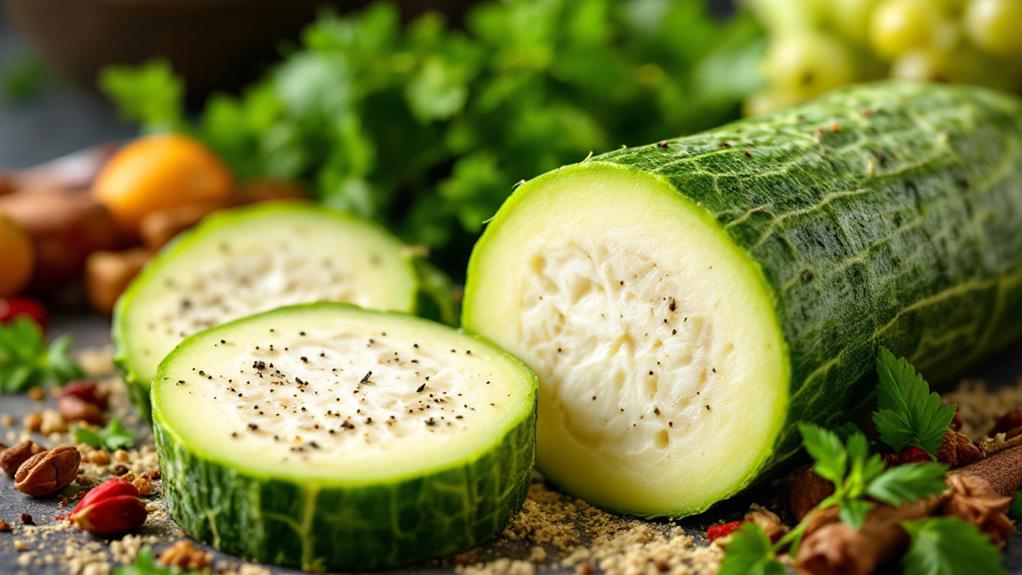The Surprising Health Benefits of Marrow Vegetable

You'll be amazed by the health benefits of marrow vegetables! These nutrient-rich squash are loaded with vitamins A, C, and K, and they're low in calories, making them perfect for managing your weight. The high fiber content aids digestion and promotes fullness, while the antioxidants help fight oxidative stress and inflammation. Marrow vegetables support heart health by lowering LDL cholesterol and regulating blood pressure, thanks to their fiber and potassium content. Furthermore, they're a boon for your immune system and can improve your skin's glow. There's even more to uncover about how this versatile veggie enhances your comprehensive well-being.
Understanding Marrow Vegetables
In the domain of understanding marrow vegetables, you're looking at a type of summer squash known as Cucurbita pepo. These vegetables stand out due to their long, cylindrical shape and lively hues, ranging from green to yellow. They're not just visually appealing; they pack a punch regarding nutrients. Rich in crucial vitamins like A, C, K, and several B-group vitamins, marrow vegetables support your general health and wellbeing.
Incorporating marrow vegetables into your diet offers numerous health benefits. With only 0.4 grams of calories per 100 grams, they're a low-calorie option, perfect if you're focused on weight loss while still obtaining significant nutrients. Their high dietary fiber content aids digestion and helps alleviate constipation, promoting a feeling of fullness that can curb overeating. This makes them an excellent enhancement to any weight management plan.
Furthermore, Cucurbita pepo is versatile in the kitchen. You can enjoy these vegetables in soups, stews, and salads, or prepare them through roasting, steaming, or pureeing. By adding marrow vegetables to your meals, you're not only enhancing flavor but also elevating your nutritional intake effortlessly.
Nutritional Composition
Exploring the nutritional composition of marrow vegetables reveals why they're such a valuable supplement to your diet. Marrow is low in calories, with just 0.4 grams per 100 grams, making it perfect for weight management. Despite its low calorie count, it's rich in fundamental vitamins, including Vitamins A, C, K, and a variety of B-group vitamins like riboflavin and folate. These nutrients play critical roles in maintaining your overall health, from enhancing your immune system to supporting cellular functions.
The dietary fiber content, approximately 0.5 grams per 100 grams, helps promote satiety, making it easier to control your appetite. Plus, the fiber aids digestion, ensuring your system runs smoothly. Key minerals like potassium, magnesium, calcium, and iron are abundant in marrow. Potassium is essential for muscle function and regulating blood pressure, while calcium contributes considerably to bone health.
Marrow is also a powerhouse of antioxidants, particularly beta-carotene, which helps combat oxidative stress and lowers the risk of chronic diseases. By incorporating marrow into your meals, you're not only enjoying a delicious vegetable but also enriching your body with crucial nutrients that support long-term health.
Digestive Health Benefits

With a significant amount of dietary fiber, marrow vegetables are a fantastic ally for your digestive health. Their fiber content, at 0.5g per 100g serving, plays a vital role in promoting regular bowel movements and alleviating constipation. By doing so, they help improve digestion and keep your digestive system running smoothly. This fiber also supports beneficial gut bacteria, boosting general gut health and ensuring your digestive tract is in prime shape.
Besides fiber, marrow vegetables boast a high water content—about 95% of their weight. This hydration is important for maintaining peak digestive function, preventing dehydration from hindering nutrient absorption and digestive processes. When you stay hydrated, your body can efficiently break down food and absorb the necessary nutrients.
Moreover, marrow is rich in antioxidants, like beta-carotene, which can reduce inflammation in your digestive tract. This can be especially beneficial if you suffer from gastrointestinal issues, as antioxidants help soothe and protect your digestive lining, contributing to long-term digestive health.
Incorporating marrow into your diet not only supports digestion but also improves nutrient absorption, ensuring you're getting the most out of your meals and promoting general wellness.
Heart Health Advantages
In regard to heart health, marrow vegetables offer numerous advantages that shouldn't be overlooked. Thanks to their rich dietary fiber content, they help lower LDL cholesterol levels, which is essential for reducing the risk of heart disease. By incorporating marrow into your diet, you're actively promoting heart health and enhancing your cardiovascular system's overall efficiency.
The potassium found in marrow plays a fundamental role in regulating blood pressure. This mineral guarantees your heart functions effectively, reducing the strain on your cardiovascular system. Furthermore, marrow's antioxidants, like vitamin C, combat oxidative stress on your heart, potentially lowering the risk of different cardiovascular complications. This antioxidant action is a key factor in maintaining a robust heart.
Regularly consuming marrow vegetables not only improves blood circulation but also supports heart function due to their impressive nutritional value. Their low-calorie nature, combined with a nutrient-rich profile, makes marrow an excellent choice for weight management. By helping you maintain a healthy weight, it further reduces obesity-related risks to your heart. So, when you prioritize marrow in your diet, you're taking a significant step toward enhancing your heart health and promoting a healthier life.
Immune System Support

While nurturing your heart health with marrow vegetables, you also give a substantial improvement to your immune system. The benefits don't stop at just cardiovascular well-being. Marrow's rich content of vitamins A and C plays a crucial role in enhancing your immune system by promoting the production of white blood cells. These cells are fundamental defenders against infections and illnesses.
Moreover, the high antioxidant levels in marrow work diligently to combat free radicals, reducing oxidative stress and inflammation that could otherwise weaken your immune system. By maintaining a robust immune function, you're less susceptible to diseases, improving your overall health.
Here's how marrow vegetables contribute to immune system support:
- Increases White Blood Cells Production: The vitamins A and C in marrow are key in improving the immune system's frontline warriors.
- Reduces Oxidative Stress: Antioxidants help mitigate the harmful effects of free radicals, promoting a stronger immune response.
- Improves Respiratory Health: The immune-enhancing properties of marrow may reduce the risk of respiratory infections.
- Supports Gut Health: The dietary fiber in marrow fosters beneficial gut bacteria, crucial for overall immune function.
Skin and Hair Benefits
Beyond just improving your immune system, marrow vegetables offer remarkable benefits for your skin and hair. Rich in Vitamin A, marrow supports healthy skin by promoting cell turnover and maintaining moisture levels. This helps reduce dryness and improve texture, giving your skin a smoother appearance. When you consume marrow vegetables, you're also taking in antioxidants like beta-carotene, which fight oxidative stress. This combats free radicals that cause premature aging and skin damage, keeping your skin youthful and radiant.
Additionally, marrow is high in Vitamin C, a key player in collagen production. Collagen is essential for maintaining skin elasticity and reducing the appearance of fine lines and wrinkles. By incorporating marrow vegetables into your diet, you can naturally improve your skin's firmness and resilience. Plus, the hydrating properties and high water content of marrow increase skin hydration, leading to a plumper, more radiant complexion.
For comprehensive skin health, nutrients in marrow like potassium and magnesium play an important role. They improve blood circulation, which promotes a healthy glow. So, adding marrow vegetables to your diet can be a simple yet effective way to improve your skin and hair's vitality.
Anti-Inflammatory Effects

Marrow vegetables pack a powerful punch against inflammation, thanks to their rich content of omega-3 fatty acids. These vital fats help reduce inflammation in your body and lower the risk of chronic diseases like arthritis and heart disease. But that's not all. Marrow's antioxidants, including beta-carotene and zeaxanthin, neutralize free radicals, combating oxidative stress and inflammatory responses.
Here's how marrow vegetables can benefit you:
- Omega-3 Fatty Acids: These are fundamental in reducing inflammation and promoting comprehensive joint health, potentially easing joint pain and swelling.
- Antioxidants: Beta-carotene and zeaxanthin work to diminish the effects of oxidative stress, supporting your body's anti-inflammatory properties.
- Dietary Fiber: High fiber content supports gut health, which is key for reducing systemic inflammation by modulating gut microbiota.
- Immune Response: The nutrient density, especially vitamins A and C, amplifies your immune system, helping lower the production of pro-inflammatory cytokines.
Incorporating marrow vegetables into your diet can be a strategic move to improve your body's anti-inflammatory response, support joint health, and maintain a more wholesome you. Remember, every bite counts towards a stronger, more resilient body.
Culinary Applications
After exploring the anti-inflammatory benefits of marrow vegetables, it's time to savor their culinary versatility. Marrow is a kitchen chameleon, effortlessly improving soups, salads, and more with its subtle flavor and impressive nutrition. You can roast, steam, or puree it, making for creative culinary applications that fit both savory and sweet recipes. Imagine a hearty soup where marrow adds a creamy texture, perfectly complementing other ingredients.
Incorporate marrow into your meals, and you'll find it a delightful way to increase hydration, thanks to its high water content. It's an excellent supplement to smoothies, offering hydration and nutrients without piling on calories. Seasonal availability of marrow means you can enjoy fresh produce at its peak. This not only improves the taste of your meals but also supports sustainable cooking practices by encouraging the use of local produce.
For a unique twist, stuff marrow with your favorite meat mixtures or experiment with it in stir-fries. Its versatility guarantees you can create dishes that are both nutritious and satisfying. Accept marrow's culinary applications and turn ordinary meals into extraordinary experiences, all while taking full advantage of its nutritional benefits.
Potential Side Effects

While marrow vegetables offer numerous health benefits, it's crucial to be aware of potential side effects. Consuming these vegetables in large amounts may lead to diverse issues, primarily due to the presence of naturally occurring compounds like cucurbitacins. These can be toxic if ingested in high quantities. A bitter taste often signals harmful levels, so exercise caution when eating them.
Here's a closer look at some potential side effects:
- Gastrointestinal distress: Overconsumption might cause bloating and diarrhea, especially in sensitive individuals. Keep your intake in moderation to avoid discomfort.
- Allergic reactions: Some people may experience allergic reactions such as skin rashes or digestive issues. If you're sensitive to marrow or related plants, it's significant to monitor your body's response.
- Nutrient imbalances: Eating too much marrow vegetable can disrupt the balance of nutrients in your diet. Maintain variety in your meals to uphold nutritional equilibrium.
- Toxicity concerns: Proper preparation methods like cooking or blanching can reduce potential toxicity and make these vegetables easier to digest.




